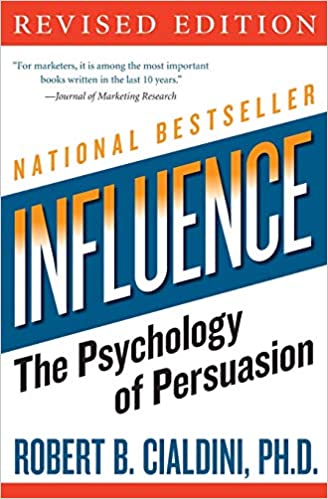Do you often fall into awkward, uncomfortable silences? Does the person in front of you keep glancing at their watch? Is there any way to save this dry conversation?
Yes, there is! There are tons of ways you can not only keep a conversation smoothly going but also be a master conversationalist.
Today, we’re sharing with you how to keep a conversation flowing! Let’s get started!

Influence
by Robert Cialdini
⏱ 16 minutes reading time
🎧 Audio version available
“Reminds Me Of”
Nothing breathes life into a dying conversation more than playing the “reminds me of” card.
This is a virtual “conversational leap.” If the weather is the current topic on hand, then don’t just comment on the weather today or how beautiful the clouds are; take a leap and draw back on a story with a similar backdrop, such as a vacation you took to somewhere sunny and the adventures or troubles you had.
If you don’t have any past experiences relevant to add, then point out something or someone and relate it to a popular topic. This will reignite the conversation faster than you think! The convo will then move in a compelling direction that keeps all parties captivated. And bonus! If you and the person you’re speaking to don’t have that much in common, this is a great way to connect with them as you trade stories.
Keep Your Filter to a Minimum
What does keeping your “filter to a minimum” mean? It’s simple. A lot of times, people run out of things to say because they think that whatever comes to their mind at that moment is boring, useless, or irrelevant to the conversation on hand, so they choose awkward silence over that potential scenario.
This phenomenon of shutting yourself down is associated with low self-esteem and insecurity. Your brain tells you that what you really want to say isn’t valuable when that simply is not the truth. Even if the topic is amiss, the conversation will still be salvageable. Laugh about it if you can.
The best advice regarding this? Say your piece! And if the other person turns out to not care or find what you’re talking about relevant, then the conversation can shift to another topic. It’s going to take a little trial and error before you find a balance.
Don’t place this insane amount of pressure on yourself to say something witty, mind-blowing, or memorable. When you try too hard, the opposite effect of what you’re after happens. You may end up looking awkward.
Throw out whatever expectations you have or pressure you feel and enjoy the conversation. Isn’t the point of conversing to show people your brilliant personality?
And hey, we’ll let you in on a little secret—a couple of secrets, actually. The first is that no matter what, some people aren’t meant to get along with others, so there’s no point in being hard on ourselves. The second secret is most people you chat with are more concerned with their end of the conversation, so they’re not paying that much attention to your stumble or awkward wording. Even if you say something awkward, they will forget about it within a few hours.
Ask Open-Ended Questions
Have you already exhausted all traditional questions?
Do you have pets? Do you like your job? Where did you go to university? What was your major?
The problem with questions like these is that they often lead to short answers without much room to elaborate. If you’re looking to indulge in some lengthy conversation, an open-ended question will have the two of you bonding over shared experiences and laughter.
A normal conversation shouldn’t sound like an interview, where one person asks questions and the other answers. The trick is to not ask one question after the other. Instead of asking whether or not they like their job or major, try saying, “What do you like or dislike the most about it?” Whatever their answer is, it’s going to be accompanied by an explanation, maybe a few jokes, and definitely another conversation beautifully following.
Constantly Do New Things
Do you feel like the reason why conversations always seem dry is that you can’t think of any fun anecdotes to add? With this tip, you can guarantee to have a few stories in your arsenal whenever the other person looks at their watch.
Take the initiative and start doing new things. Break that routine of going to work, coming home, eating, and repeating the next morning. Go on hikes, join clubs, go on road trips—do something that adds diversity to your conversations. It doesn’t even have to be something completely outlandish. You can just order a different dish at a restaurant that you never tried before; maybe watch a new genre of movies or listen to new music. What matters is that you gather some valuable life experience under your belt, so whenever the need arises, you’ll have a plethora of subjects on hand to spin an interesting tale with.
Recycle Earlier Topics
This is a last resort for dry conversations, but it’s bound to work. No new idea as to what to add to the conversation? How about recycling an earlier topic? Everyone has something great to add to a topic, but the subject changed before they could have the bravery to speak up.
Well, this is your chance! You avoid awkward silence and pivot back to something you wanted to talk about. Then, implement that open-ended question advice we just mentioned and follow that up with questions to keep things going. From there, the pressure of holding up the conversation yourself is passed to the other person.
Ask relevant questions, share relevant stories, and enjoy the conversation!
Prepare Ahead
What do most people do when they feel like they’re unskilled in something in particular? They practice that skill, and most importantly, they prepare ahead.
So, prepare what you want to say ahead of time. Don’t memorize it—it’s okay to go off-topic, but having a few stories in your head may just save a dying conversation.
This also works if you normally find yourself talking about the same topics over and over again. Before this interaction is due to happen, brainstorm some topics and stories beforehand.
The next time someone asks you what you did for summer last year, what you do for work, what you like to do for fun, and about your family, you will already know what you’re going to say. It may sound like a lot of hard work for one conversation, but this pre-prepared subject will stick with you. You may even find yourself improving the way you tell the story or remembering interesting details.
Even if you have to write it down, that’s okay! Take your time. It’s okay to mess up, and it’s certainly okay to not recite everything word for word.
Know When to End the Conversation
This is the last tip concerning this subject. After having a fantastic, lousy, or whatever kind of discussion, it’s just as important to know when to end the conversation—just as important as it is to know how to never run out of things to say. Most people—and this is something that’s proven by science and numerous studies—don’t know when to stop or if they should keep talking during a one-on-one conversation. But this is an essential skill. If the conversation has ended on a happy note, there’s an appointment you need to get to, or you really want to get out of the situation, then gracefully bow out.
What Is Snapreads?

With the Snapreads app, you get the key insights from the best nonfiction books in minutes, not hours or days. Our experts transform these books into quick, memorable, easy-to-understand insights you can read when you have the time or listen to them on the go.
